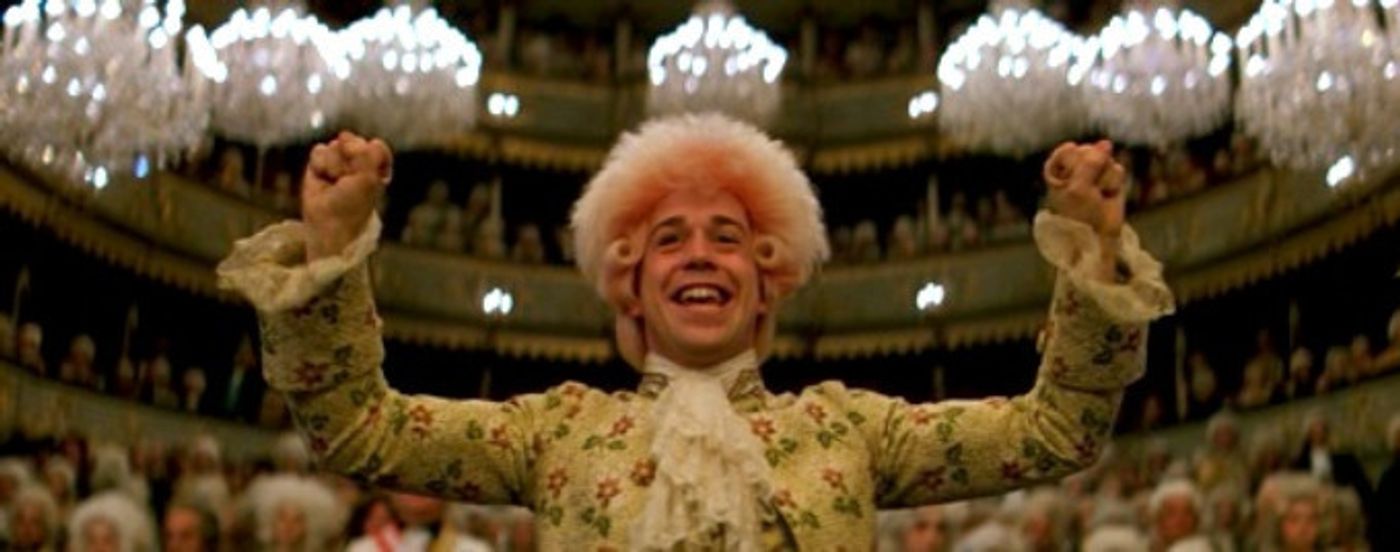Review: AMADEUS - LIVE at New York Philharmonic - Just As Many Notes As Were Required

Currently, the New York Philharmonic is presenting the movie masterpiece Amadeus with live orchestrations as part of their Art of the Score series. They have removed the prerecorded orchestral and choral elements from the film and replaced them with live manifestations. It's breathtaking and requires a trip to Lincoln Center.
To open the concert, Tom Hulce (who played the title role in the movie) walked out in exceptionally Mozartian style - respectful of the moment, but charmingly disheveled. He spent the next several minutes, before the start of the program, spilling all sorts of delicious behind the scenes tea, including the time he corrected an oboist who'd missed an entrance, praises for the glorious F. Murray Abraham, and a recounting of the time he intentionally skipped sections of dialogue in the dictation scene, forcing Salieri (Abraham) into confusion - ensuring Mozart would be seen as the superior musician in the end. His final anecdote included an orchestral rehearsal he'd attended before filming began. Once the musicians were warmed up and deeply entrenched in their playing, Hulce was given permission to sit among them. After containing himself for a few minutes, he slowly, sneakily sunk to the ground and started crawling in and around the feet of the players. Eventually, he followed the musical themes from section to section, truly burrowing himself inside Mozart's music.
And that's what the New York Phil is doing for Amadeus: Live audiences. By taking one of the leading characters in the film (music) and placing them live, in the room, it alters the experience in an inexplicable way. It forces a juxtaposition of the prerecorded, brilliantly acted performances of this monumental film and the exciting fallibility of live performance, creating a dissonance that draws beautiful attention to the transcendence of music. By the fourth cue, you've almost forgotten the existing score has been removed and replaced it with a live performance because the execution is seamless. What you do begin to notice is the infinite power contained within the music. And as the evening progresses, its power and significance become undeniable - by the time the Requiem is introduced, I was utterly entranced.
Something about the poignant acting and Mozart's incredible Requiem intertwined to create a chilling exploration of death. Never before had this piece of music forced me to crawl on my knees and explore death's realities the way this experience had. Its overwhelming inevitability forced an introspective, intimate moment in the middle of Geffen Hall. The abutting of the giant hall and my quiet, personal thoughts was not lost on me. And as I sat there, thinking about the forces larger than myself, than all of us, I wondered how Mozart must have felt - a little man who'd unleashed a genius inside that was, perhaps, too great for him to handle. A great force, barreling towards him, inevitable, uncontrollable, and as he shrank against the power of his genius, the power of his death, it seemed that his only defense was creation. Maybe that's our only defense as well. As the inevitable looms, whatever it may be, maybe the best and only effective response is creation - be it friendships, or a family, food, or art. Maybe creation is the point.
So, go participate in as much creation as possible - find your way to Geffen Hall. I promise the New York Philharmonic's power of creation will defend you from the inevitable, even if only for a moment.
Reader Reviews

Videos

